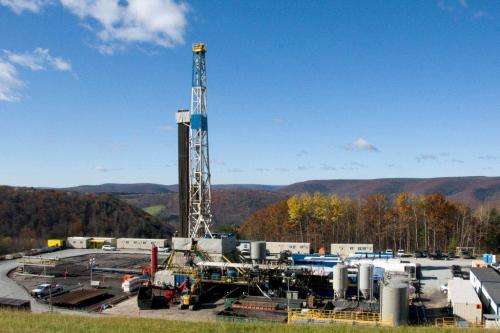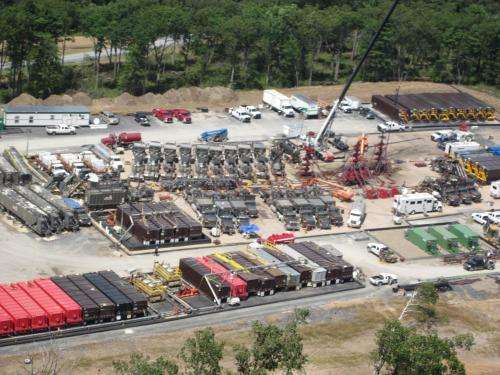May 17, 2013 weblog
Fracking risks to ground water assessed

(Phys.org) —Extraction of "unconventional" gas from sedimentary rocks such as shale could provide a clean energy source and help some regions to become energy independent, but concerns have been raised about risks such as the contamination of ground water. The current knowledge of these risks has now been assessed in a review published in Science this week.
Shale is a glassy type of sedimentary rock that is often deep underground - up to a mile or more - and contains deposits of tightly bound natural gas. Unconventional gas is also found in tightly packed sand deposits and in coal seams. Conventional natural gas is extracted from porous sandstone or carbonates.
In the article, Professor Radisav Vidic of the University of Pittsburgh and colleagues reviewed the current state of knowledge on the environmental and other risks of hydraulic fracturing (fracking), which is a process that has been known for decades, but has only recently become widespread.
The fracking process involves drilling down to the sedimentary rock and then drilling horizontal wells through the rock. Large amounts of a fluid mixture are then injected into the rock at high pressure to fracture it and release the tightly bound natural gas into the wells.

The fluid mixture contains water and sand, and a mix of chemicals to reduce friction, scaling, and microbial contamination. Over 750 different additives have been used in fracking operations in the US, including coffee grounds, organic polymers, hydrochloric acid, and petroleum distillates. Some of the additives used are not at present subject to regulation.
Much of the fluid is recovered, but the remainder is lost, and it is not known whether it stays in the rock or is absorbed into deep ground water or migrates away from the site. Dr. Vidic said it is possible that some of the water could reach the drinking water aquifers at shallower levels through cracks in the rock. The waste water is contaminated with up to 10 times the level of salt found in seawater, with radioactive and organic materials, and other chemicals such as bromides released from the rock. In Pennsylvania in the US, around 26 million barrels of waste water are recovered each year from the Marcellus shale field.
Another risk of fracking is contamination by gas into shallow groundwater caused by faulty seals. The rate of seal failure is around 1-3%, but owners of private wells located near fracking sites have reported the presence of methane in their well water. The methane could be from natural sources, especially in Pennsylvania where there is a naturally high level of methane in well water. There is often no reliable data available of pre-drilling methane levels.
Vidic and his co-authors warn that water extracted from private wells should be monitored more thoroughly than it is at present. They also point out that it is also important to identify abandoned oil and gas wells in the vicinity of fracking wells, as the presence of abandoned wells is believed to have led to at least one incidence of contamination of drinking water by fracking fluid.
The team also suggests that it is critical for water management that the exact composition of the fracking fluid and recovered waste water is known. At present the recovered water is either injected back into the wells for (theoretically) permanent storage, or cleaned and re-used, but as the gas is extracted there will be less opportunity to re-use the water. The authors therefore urge that sustainable and permanent solutions for disposing of the contaminated water need to be developed.
Vidic warned that the fracking industry is ignoring these issues, and while there is no evidence yet of "severe" environmental pollution, there will be a time in the future when the waste water cannot be re-used or disposed of as it is today. Treating it will be expensive and produce solids such as salt that will have to be properly disposed of.
More information: Science 17 May 2013: Vol. 340 no. 6134 DOI: 10.1126/science.1235009
Journal information: Science
© 2013 Phys.org















